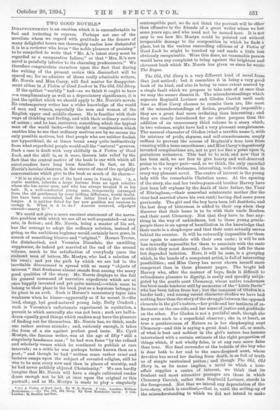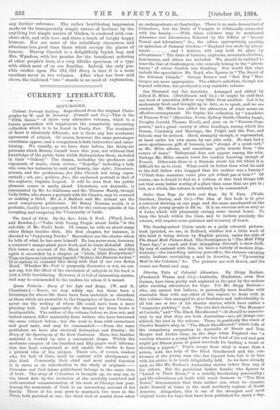TWO GOOD NOVELS,*
DISAPPOINTMENT is an emotion which it is uncomfortable to feel and irritating to express. Perhaps not one of the novelists whom we regard with gratitude as the donors of many delightful hours can thoroughly realise how distasteful it is to a reviewer who loves "the noble pleasure of praising" to be compelled to write that "Mr. A's latest story must be regarded as a comparative failure," or that "Mrs. B.'s new novel is painfully inferior to its charming predecessors." We therefore congratulate ourselves upon the fact that during the writing of the present review this discomfort will be spared us ; for no admirer of those really admirable writers, Mr. Norris and Miss Carey, will find matter for disappoint- ment either in A Victim of Good Luck or in The Old, Old Story. If the epithet " worldly " had—as we think it ought to have —a complimentary as well as a depreciatory significance, it is just the epithet which we should apply to Mr. Norris's novels. No contemporary writer has a wider knowledge of the world of men and women, especially the men and women of the English upper and middle classes. He is familiar with their ways of thinking and feeling, and with their ordinary motives of action ; and he has, moreover, something which the typical man of the world lacks,—the insight or imagination which enables him to see that ordinary motives are by no means the only possible motives, but that people who are neither foolish nor hypocritical, do at times break away quite instinctively from what superficial people would call the "natural " grooves. Such a case is dealt with very skilfully in A Victim of Good Luck, and the skill is, as it were, thrown into relief by the fact that the central motive of the book is one with which all novel-readers have long been familiar. In fact, as Mr. Norris's heroine observes, in the course of one of the sprightly conversations which give to the book so much of its charm— "It is as simple as one of the hard cases in Vanity Pair. 'A, a rustic maiden, inherits a large fortune from an aged relative whom she has never seen, and who has always treated B as his heir. B, a well-conducted young man, temporarily estranged from the old gentleman by some trifling difference, would doubt- less have been reinstated, had the latter lived a few months longer. A is neither fitted for her new position nor anxious to occupy it. What is A to do ? Answer received, adjudged correct—marry B.'" We could not give a more succinct statement of the narra- tive problem with which we are all so well acquainted—at any rate, in fiction ; and Mr. Norris, being a master of his art, has the courage to adopt the ordinary solution, instead of going, as the ambitious beginner would certainly have gone, in search of something bizarre and "original." Horace Trevor, the disinherited, and Veronica Dimsdale, the unwilling supplanter, do indeed get married at the end of the second volume, much to the satisfaction of everybody (save the eminent man of letters, Mr. Mostyn, who had a solution of his own); and yet the path by which we are led to the inevitable denouement is spread with so many "objects of interest" that freshness almost stands first among the many good qualities of the story. Mr. Norris displays to the full his general command of narrative expedients which are at once happily invented and yet quite natural,—which seem to belong to their place in the book just as a keystone belongs to its place in an arch. Such is Horace's momentary lapse into weakness when he kisses—apparently as if he meant it—the loud, slangy, but good-natured young lady, Dolly Credo& ; such is Veronica's unfortunate experiment in equitation, a pursuit to which assuredly she was not born ; such are half-a- dozen equally good things which readers may have the pleasure of finding out for themselves. Mr. Norris has, we think, made one rather serious mistake ; and, curiously enough, it takes the form of a sin against perfect good taste. Mr. Cyril Mostyn, the famous writer, was at the age of fifty "still a singularly handsome man ; " he had won fame "by the refined and scholarly verses which he continued to publish at rare intervals; as a critic he was perhaps better known than as a poet;" and though he had "written some rather cruel and incisive essays upon the subject of revealed religion, still he was to be seen every now and then in places of worship, and he had never publicly abjured Christianity." We can hardly imagine that Mr. Norris will have a single cultivated reader dense enough not to hit at once upon the original or this portrait ; and as Mr. Mostyn is made to play a singularly • (1.) A Victim. of Good Ludt. By W. E. Norris. 2 yds. London: William nomemn.—(2.) The Old, Old Story. By Rom lionohette Carey. 3 vole. London: B.. Bentley and Son. contemptible part, wo do not think the portrait will be other than offensive to the friends of a great writer whom we lost some years ago, and who need not be named here. It is not easy to see how Mr. Mostyn could be painted out without irreparable damage to the composition in which be finds a. place, but in the various succeeding editions of A Victim of Good Luck he might be touched up and made a little lesa obviously recognisable. Were this done, no reasonable person would have any complaint to bring against the brightest and cleverest book which Mr. Norris has given us since he wrote. The Rogue.
The Old, Old Story is a very different kind of novel from that just noticed ; but it resembles it in being a very good book of its kind, and also in being to some extent marred by a single fault which we propose to take note of at once that we may the sooner dismiss it. The misunderstandings which separate Reginald Lorimer and Gloden Carrick until such time as Miss Carey chooses to reunite them are, like most of the misunderstandings of fiction, practically impossible ;. they are a great deal more irritating than interesting ; and they are clearly introduced for no other purpose than the- addition of an unnecessary third volume to a story which, in two volumes, might have had a very pleasant completeness. The natural character of Gloden (what a terrible name I), with its mixture of pride, shyness, and self-consciousness, amply suffices to prevent the course of Reginald's true love from running with a tame smoothness; and Miss Carey's ingeniously invented complications are, not to put too fine a point upon it, gratuitous nuisances. This had to be said, and now that it has been said, we are free to give hearty and well-deserved praise to the larger part—and, as we think, the only essential part—to a very wholesome, interesting, well-written, and in every way pleasant novel. The centre of interest is the young lady with the remarkable Christian name. At the opening of the story, she and her twelve-years-old brother Harvey have just been left orphans by the death of their father, the Vicar- of Eltringham,—their somewhat aristocratic mother (for the vicar had married above his own rank) having died some years previously. The girl and the boy have been left destitute, and the last drop of bitterness is added to their cup when they discover that their home is to be with their uncle Reuben and their aunt Clemency. Not that they have to fear any- thing in the way of unkindness, but to these young gentle people there is an agony of humiliation in the knowledge that their uncle is a shopkeeper and that their aunt actually serves behind the counter. It will be outwardly impossible for them ever again to associate with their own caste ; it will be not less inwardly impossible for them to associate with the caste to which they must descend ; there is nothing left for them but degraded isolation. Here, it will be seen, is a grouping which, in the hands of a competent artist, is full of interesting possibilities ; and Miss Carey has never shown herself more competent than in these pleasant pages. The bright lad Harvey who, after the manner of boys, finds it difficult to, subordinate pleasure to dignity, is easily and speedily subju- gated by the gentle aunt Clemency, whose native tenderness has been made tenderer still by memories of the "Little Davie' who has been taken from her; but the conquest of Gloden is a harder task; and among recent character-studies we have had nothing finer than the story of the struggle between the opposed elements in the girl's nature,—her pride and her instincts of re- finement on the one side, and her sense of justice and gratitude on the other. For Gloden is not a youthful snob, though she may seem such to a superficial observer ; she is, at heart, as true a gentlewoman of Nature as is her shopkeeping aunt Clemency—and this is saying a great deal; but all, or much, of what is best and noblest in the girl's nature has become. intertwined with a certain estimate of the right proportion of things which, if not wholly false, is at any rate more false. than true. Her final surrender at the bedside of the boy who. is dear both to her and to the once-despised aunt, whose devotion has saved her darling from death, is as full of truth as of simple unstrained pathos ; and though The Old, Old Story is, as its name implies, a novel to which a love- affair supplies a centre of interest, we think that it freshest and most attractive passages are those in which Clemency Carrick, rather than Reginald Lorimer, stands in the foreground. Not that we intend any depreciation of the love-story, which is excellent,—that is, until the setting-up of the misunderstanding to which we aid not intend to make any further reference. The rather bewildering impression made on the transparently simple nature of Lorimer by the anything but simple nature of Gloden, is rendered with con- stant skill, and with here and there a touch of bright happy humour. Nor are some of the subsidiary characters and situations less good than those which occupy the places of honour. Harvey Carrick is a delightfully boyish boy, and Mrs. Wyndam, with her passion for the beneficent ordering of other people's lives, is a very lifelike specimen of a type with which most of us are familiar. Indeed, the only pos- sible verdict upon The Old, Old Story is that it is a most excellent novel in two volumes. After what has been said above, the italicised " two " stands in no need of explanation.





































 Previous page
Previous page